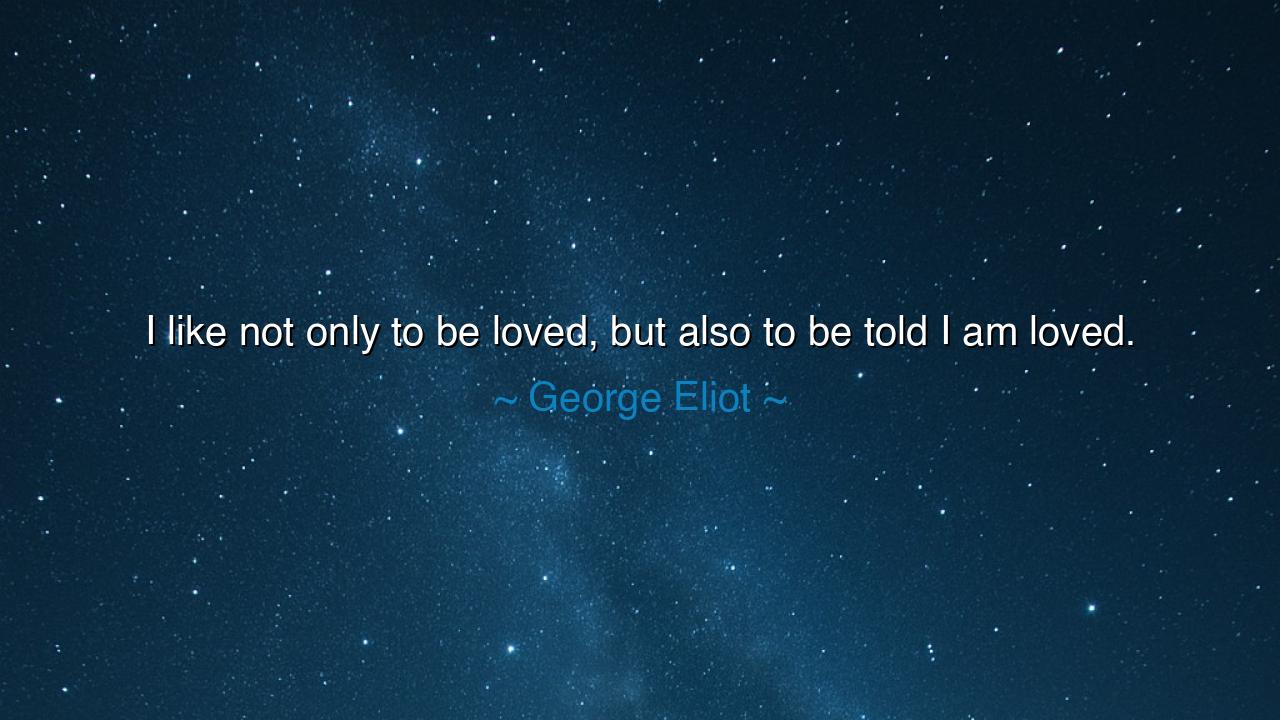
I like not only to be loved, but also to be told I am loved.






"I like not only to be loved, but also to be told I am loved." These poignant words by the great George Eliot speak to a profound truth about the human soul—a truth that has echoed through the ages. To be loved is a gift, a blessing that enriches our hearts, but the desire to hear that love spoken aloud is a deeper need, one that reveals the vulnerability of our existence. Love is not a one-way river; it is a living exchange between souls. When love is spoken, when we hear the words that affirm what we feel, it brings comfort, security, and a deeper connection. To be told we are loved is not simply to hear words, but to have our hearts nourished, to have our invisible bond with another person made visible, tangible, and real.
In the wisdom of the ancients, the concept of love was often linked to connection and communication. The Greeks viewed love not as a fleeting emotion but as a divine force, a connection between human beings that was more than just physical attraction. The philosopher Aristotle, in his work on ethics, defined love as a bond built on mutual respect and understanding. True love, he believed, is not only in the affection we feel for one another, but in the way we express that love through actions and words. The ancient philosophers understood that love is a force that must be nourished—it must be communicated, not just felt inwardly. Eliot’s quote builds on this ancient idea, suggesting that spoken love strengthens the bond between individuals, reinforcing the connection and allowing love to grow.
Consider, for example, the relationship between Antony and Cleopatra. Their love was not only marked by passion and intensity but also by the need for affirmation. Cleopatra, despite her great power as queen, needed to hear Antony’s devotion to her, to know that their bond was acknowledged aloud and celebrated. When he returned to her after a period of separation, his words reaffirmed their deep connection, and Cleopatra, though a powerful ruler, found peace in his declarations of love. In this way, their relationship demonstrates that even the most powerful figures require reassurance in love—that spoken words can strengthen what is felt in the heart, ensuring that love does not remain a silent, unseen force but is recognized and celebrated between two people.
Similarly, Elizabeth Barrett Browning, a renowned poet, captured the essence of spoken love in her famous line, “How do I love thee? Let me count the ways.” This line is not simply a romantic expression; it is an invitation for love to be articulated, for affection to be not only felt but also spoken. Browning’s love for her husband, Robert Browning, was profound and deeply emotional, yet their letters, filled with declarations of love, show how even the most private emotions become stronger when they are shared aloud. The act of speaking love is an affirmation of its power and truth, not just a whispered thought but a declaration that has weight and meaning.
George Eliot’s quote also speaks to the inherent human need for acknowledgment and validation. We live in a world where much of our emotional experience is internalized, and while we may feel love deeply, we often need others to witness and acknowledge that love. It is in hearing the words, in the spoken affirmation, that love takes on a fuller meaning. To be told we are loved is to receive not only affection but also the recognition of our worth. It is in this verbal affirmation that love transcends the internal, becoming something that exists not just in our hearts but in the external world, woven into the fabric of our relationships.
The lesson from Eliot’s words is simple yet profound: love must be expressed, not only through actions but through words. To love is to act, yes, but it is also to speak those actions aloud, to affirm to those we love that our feelings are true and unwavering. Spoken love is a gift, a way of turning our deepest emotions into something tangible, something that binds us more closely to one another. It is an act of both vulnerability and trust, a recognition that love cannot grow in silence alone but must be nurtured and shared.
In your own life, reflect on the ways in which you express love. Are your actions enough, or do you also take the time to speak the words that affirm your love? If you love deeply, let those you care about know it—not just through your actions but through the words you say. Speak love openly, freely, and often. If you are loved, embrace the affirmation that comes with it, for in those words, you will find not only the beauty of the moment but the strength of a bond that has been spoken into existence. Love, when it is both felt and spoken, has the power to elevate our connections, to transform our relationships, and to make the invisible visible.






AAdministratorAdministrator
Welcome, honored guests. Please leave a comment, we will respond soon